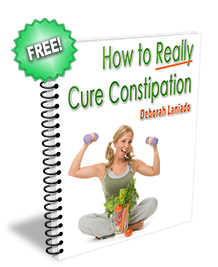What are the causes of constipation?
Here are the most common causes of constipation:
Ignoring the urge
When you ignore the urge to defecate, the brain/bowel connection becomes weak and your bowel becomes sluggish and lazy. It's common to feel the urge first thing in the morning, or about 30 minutes after a meal.
Lack of fibre
Most people do not eat enough fibre (roughage), the part of fruits, vegetables and grains that cannot be digested by the body. Fibre tends to stay in your gut, adding bulk and softness to your stools, and speeds up the removal of waste and toxins from your intestines. Adults and children often eat highly refined and processed food where the natural fibre has been removed. This can lead to constipation.
Lack of fluids
When you drink fluids to reduce dehydration, the liquids add fluid to the colon and bulk to the stools; the bowel movements therefore become easier. But when you drink caffeine (coffee, cola drinks) or alcohol, you become more dehydrated; the fluid leaves the colon, making it more difficult for the bowel to move the stools along. This can also lead to constipation.
Lack of exercise
The generally perceived wisdom is that exercise reduces the time it takes for food to move through the large intestine, which limits the amount of water the body absorbs from the stool. Less exercise means a higher likelihood of hard, dry stools which are more difficult to pass.
With physical exercise, you also use the muscles in your abdomen which helps tone the colon and stimulate it's peristaltic waves (the contraction of your muscles that pushes food through your digestive system). For example, the yoga asana 'half spinal twist' helps squeeze the colon and push the faeces through.
Medication
Constipation may be a side effect of a medicine you are taking. Here are the worst culprits:
- antacids, especially those containing aluminium or calcium (usually used to treat indigestion or heartburn by neutralizing stomach acid).
Listen: your stomach is supposed to have acid in it. Hydrochloric acid (HCI) in the stomach is the major way we break down our food; it turns the food into a soupy mix which is passed on to the small intestine where the nutrients are absorbed into the body.
When you have low stomach acid, foods don’t get broken down properly, and they are unable to be fully absorbed and digested. This creates an immune cascade, stimulating your immune system into action, as it thinks there is an invasion. This in turn creates low grade inflammation in your body, resulting in either diarrhoea or constipation. Long term, this can cause serious health problems and deficiency in vitamins and minerals. - anti-depressants (a psychiatric medication used for mood disorders such as major depression, but slow the movement of food through the intestines).
- anti-psychotics (used to treat mania, anxiety, schizophrenia).
- calcium channel blockers (used to treat high blood pressure and heart conditions).
- anti-epileptics (used in the treatment of epileptic seizures).
- iron supplements (often used to treat iron deficiency anaemia).
- diuretics (used for high blood pressure or heart failure).
- pain-killers or cough medicines.
I'm not recommending you stop taking a medicine that has been prescribed for you just because it's making you constipated—you most likely need it! But your doctor may recommend an alternative that eases the condition, or you can add healing foods and nutrients to your diet to improve any discomfort.
Laxative abuse
Doctors often recommend laxatives as a medicine to help you pass stools. But even ‘natural’ laxatives used long term can cause the bowel to become sluggish and reliant on the medication. They also act as an irritant to the bowel wall.
Pregnancy
About 40% of pregnant women experience constipation at some point during their pregnancy—mainly during the early stages.
The main reason is that during pregnancy, the body secretes more of the hormone progesterone which has several functions such as: suppressing further ovulation (the release of a mature egg from the ovary); and encouraging the growth of milk-producing glands in the breasts.
Your bowel normally moves waste through the bowels through a process called peristalsis; this is where the muscles contract and relax in a wave-like motion. Each peristaltic wave lasts for a few seconds and allows food to travel a few centimetres per second. But during pregnancy, the progesterone level increases, so the bowels tend to relax more than they contract and this makes it harder to move food and waste along. This can lead to constipation.
Lifestyle change
This is mainly covered in other sections. But going back to pregnancy for a moment, this likely imposes a lifestyle change on a mother-to-be. As the baby grows, it's difficult for a pregnant woman to get the exercise she needs; the more she should consume water and fibre, the more likely she is to surrender to food cravings and foods high in fat.
Hypothyroidism
Hypothyroidism occurs when there isn't enough of the thyroid hormone being produced by the thyroid gland and occurs in about three percent of the general population. One common cause is lithium-based mood stabilizes often used to treat bipolar disorders (manic depression). Hypothyroidism needs to be checked by a doctor, especially for women over 40.
Symptoms include:
- Reduced energy levels: fatigue, lack of enthusiasm and energy is a common symptom of a low-functioning thyroid. This is also a classic sign of depression, so if you’ve been diagnosed with depression, you’ll want to make sure your physician checks your thyroid levels.
- Weight gain: easy weight gain, or difficulty losing weight, despite an aggressive exercise program and diet.
- Dry, rough or scaly skin, and dry, tangled hair: in the winter months, many of us experience bouts of dry skin and hair, but if you have perpetually dry skin that doesn’t respond well, then hypothyroidism is a consideration.
- Hair loss: women, especially, will want to pay attention to their thyroid when unexplained hair loss occurs. Fortunately, if your hair loss is due to low thyroid function, your hair will come back with proper treatment.
- Sensitivity to cold: feeling cold all the time is also an indicator of low thyroid function.
Cancer
Colon or rectal cancer can narrow the bowel and rectum, making it difficult to have a bowel motion. About 6 per cent of the population in Western countries develop bowel cancer at some time during their lives, making this the second commonest cause of cancer-related death.
But constipation can also be caused by the chemotherapy drugs used to treat the cancer, as they affect the nerve supply to the bowel. What's worse is that the painkillers used to treat the cancer and the anti-sickness drugs used in the chemotherapy can themselves cause constipation. It's a catch-22 situation. Nasty.
Diabetes
One of the most common complications for the diabetic is nerve damage to the digestive system. This causes the stomach to empty too slowly (a condition known as gastroparesis) which in it's severe form causes nausea, vomiting, bloating, loss of appetite and constipation alternating with frequent diarrhoea, especially at night.
Being under, or overweight
Being underweight could be due to an imbalanced diet, physical or psychological health conditions, lifestyle, a medical condition, missing meals, habitual fasting or chronic diarrhoea.
Being overweight can also be due to an imbalanced diet as well as too much alcohol consumption, eating the wrong kind of fats, physical inactivity and certain medicines.
Any of which could cause constipation.
Stress & anxiety
Stress can make you change your lifestyle. Eating "fast-food" on the run—especially foods that cause constipation (fatty snacks, milk, cheese, yoghurt, bread pasta)—leads to a vicious circle of more stress and more constipation.
Nervous reactions, anxiety and stress can also close the internal anal sphincter, a muscle which is not under our voluntary control.
Depression
Depression and constipation are often found together. When you're feeling depressed, the most common thing people do is reach out for some unhealthy but delicious comfort foods; usually without any exercise.
These foods are usually highly processed and cause stickiness in the digestive system, leading to inflammation. The bowel is known as the second brain, and if your bowel isn't functioning properly then it is likely you will not be producing the necessary hormones for overall good emotional health. Depression can also lead to diarrhoea and irritable bowel syndrome symptoms, depending on the individual and whatever he or she is most prone to. This in turn makes you feel depressed. Another vicious circle.
Quitting smoking
Nicotine acts as a stimulant laxative to the digestive system, so constipation is less likely; in fact, most smokers find they go to the toilet regularly. But when you give up smoking, you find you're not going to the toilet so frequently; in fact, you could end up more constipated until your body readjusts to life without the stimulant.
---
If you're a hypochondriac, please relax! You probably haven't got cancer, diabetes or hypothyroidism. You probably gave up smoking, got a bit depressed and ate a chocolate cake with your Starbuck's latte.
Free report: "How to Really Cure Constipation" by Deborah Laniado (23 pages)
No need to sign up. Just click on the image below to download your free 23 page special report: "How to Really Cure Constipation".
It contains all these natural cures and information on what constipation is, what causes constipation, what is supposed to happen in your body and an understanding of the disease symptom tree.
All natural guarantee: no pills or harmful techniques.
Inside you'll discover:
- 10 ways to check for constipation.
- 8 types of medicine that can cause constipation.
- Why All-Bran cereal actually makes things worse.
- Why pasta is the worst thing you can eat.
- 7 things you can do right now to cure your constipation naturally.
Go ahead and put in your details above and I'll send your free report immediately.
We'll go into detail about how to cure your constipation with natural methods—no pills or harmful techniques—as well as any related symptoms you may be suffering.
Follow my advice for regular and easy bowel movements—no more straining! You'll also feel renewed energy, fresher breath and you may even lose weight!
Go ahead and sign up now. I'll send you the report immediately.
Call Deborah on 020 7101 4471 for a free phone consultation, check out our prices, or:
Click here to ask Deborah a question >>
If you've already booked an appointment, please check out these 7 tips for how to prepare for a comfortable colonic.

Convenient location
North London Colonics
Side Entrance
192 Goldhurst Terrace
West Hampstead
London
NW6 3HN
Prices
Over 18 years in clinical practice
First 90 minute treatment is £175.
Repeat treatments are £150 (for 1hr).
See prices for more deals.
Clinic hours
Monday to Friday: 8am - 8pm
Saturday: 9am - 6pm
Experienced therapists
Deborah Laniado (CNM, ARCH, Dip. Herb) is an experienced colonic hydrotherapist with 1000s of satisfied clients.



